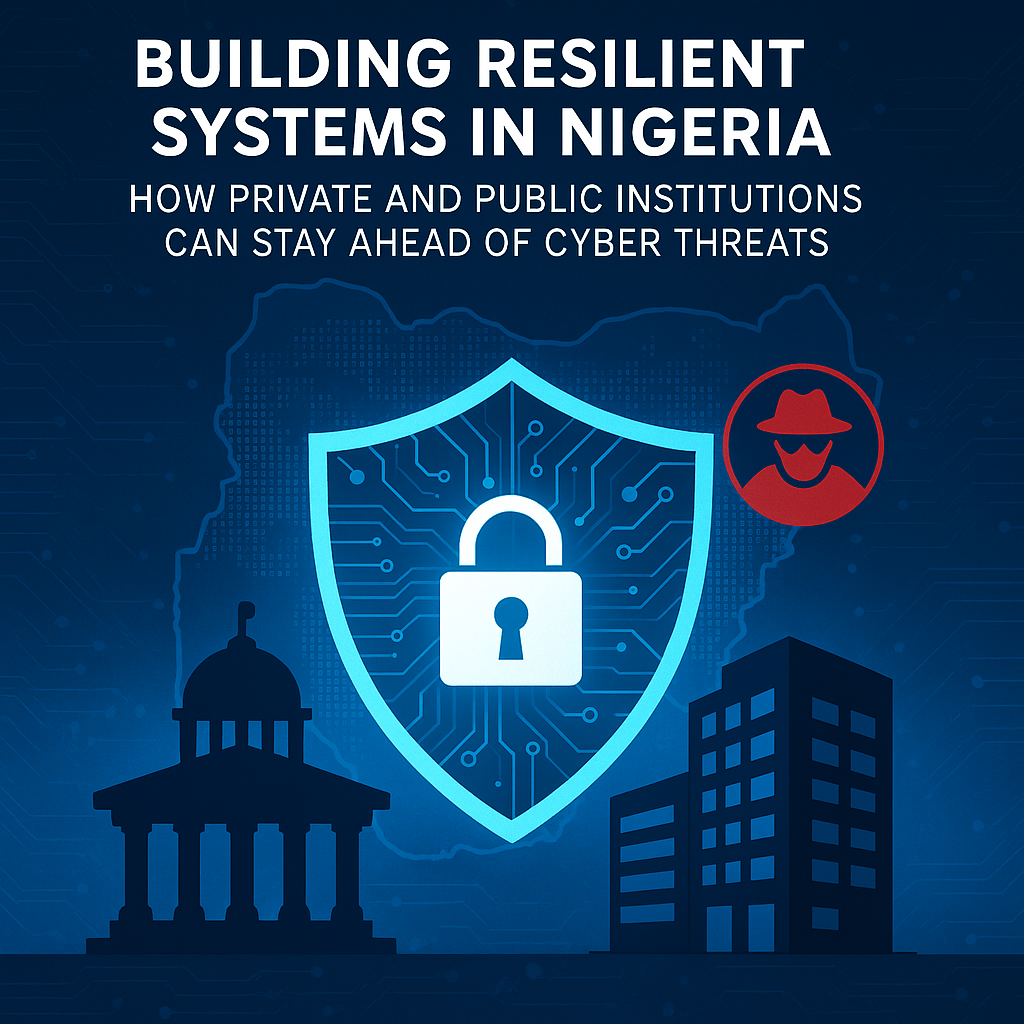
Cybersecurity in Nigeria is no longer an abstract problem for future board meetings. It is a daily concern for banks, energy companies, ministries, hospitals, and even small businesses. With millions of cyber threats recorded in the country within months, the need for resilience is not optional. It is survival. Both private and public institutions face targeted phishing campaigns, ransomware attacks, insider risks, and exposure of critical infrastructure. The question is, how do they stay ahead?
This post explores practical steps for building resilient systems in Nigeria. It blends security and governance principles with local context, drawing on regulatory expectations, real-world examples, and practical strategies.
Why Cyber Resilience Matters More Than Ever
Think about what happens when a public service portal is knocked offline by an attack. Citizens lose trust. Delays ripple through systems. In the private sector, downtime means lost revenue, reputational damage, and sometimes regulatory fines.
Resilience is not only about technology. It is about people, processes, and governance. Nigerian organisations are learning that compliance frameworks, security tools, and awareness programs must be combined if they want to withstand persistent attacks.
Nigeria’s Cyber Threat Environment
Recent reports show a sharp rise in password-stealer attacks, ransomware, and financial scams targeting Nigerians. Public institutions are attractive targets because of the sensitive data they manage. Private firms, especially in finance and telecom, face relentless fraud attempts and phishing schemes.
Common threats include:
Each of these threats undermines trust in Nigeria’s digital economy.
Challenges Facing Public and Private Institutions
Building Blocks of Cyber Resilience
Governance and Leadership
Resilience starts at the top. Boards and executives need to treat cybersecurity as a strategic priority, not just an IT issue. This means assigning clear accountability, funding security programs, and embedding risk management into decision-making.
Risk Assessment and Prioritization
Organisations should identify their most critical assets and the threats most likely to affect them. For banks, that could be payment systems. For ministries, it may be citizen data. Once risks are mapped, controls can be applied more effectively.
Security Controls and Monitoring
Strong access management, encryption, and network segmentation reduce attack surfaces. Continuous monitoring through Security Operations Centers (SOCs) ensures threats are detected early.
Data Protection and Privacy
With GDPR and Nigeria’s own data protection frameworks in play, privacy must be built into every system. Anonymization, consent management, and clear data-handling practices are essential.
Awareness and Training
Cybersecurity is everyone’s responsibility. Regular training, simulated phishing campaigns, and culture-building activities raise awareness and reduce insider risks.
Incident Response and Recovery
No system is breach-proof. What matters is how quickly an organisation detects, responds, and recovers. A tested incident response plan, backed by backups and business continuity planning, ensures minimal disruption.
Sector-Specific Considerations
Banking and Financial Services
The financial sector is heavily targeted by phishing, ransomware, and insider fraud. Nigerian banks need strong authentication systems, fraud detection tools, and real-time monitoring. Integrating AI-driven anomaly detection helps spot unusual transactions before damage occurs.
Public Sector and Ministries
Government agencies manage citizen records, tax systems, and national infrastructure. They must prioritize resilience by securing data centers, enforcing strong authentication for portals, and investing in regular penetration testing. Public trust depends on it.
Healthcare
Hospitals and health agencies store sensitive patient data. Ransomware attacks here are not only costly but life-threatening. Cyber hygiene in healthcare must include secure medical devices, regular staff awareness, and encrypted communication.
Energy and Critical Infrastructure
Attacks on the power grid or oil and gas pipelines can have national consequences. Industrial Control Systems (ICS) must be protected with strict segmentation, patching, and continuous threat monitoring.
Practical Strategies for Staying Ahead
The Role of Collaboration
Resilience is stronger when institutions work together. The private sector brings innovation and agility. The public sector provides policy direction and enforcement. By collaborating, they can pool resources, share intelligence, and raise the bar for national security.
Looking Ahead
Cyber threats will not slow down. With AI-powered attacks and geopolitical risks in play, Nigerian institutions must plan for the unexpected. Building resilience is a journey, not a project. Every organisation that treats security as a business priority contributes to a stronger, safer digital Nigeria.
Final Takeaway
Resilient systems are not built overnight. They come from consistent investment in governance, technology, and people. Nigerian institutions, both public and private, have an opportunity to lead by example. By adopting proactive measures today, they position themselves not only to withstand threats but to earn the trust of citizens, customers, and partners tomorrow.